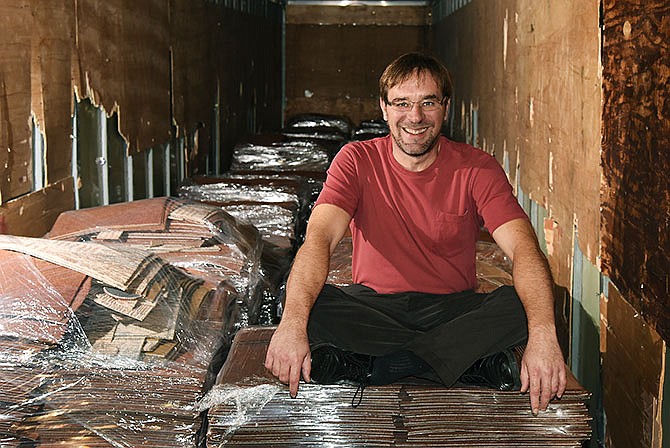Rob Didriksen's office is a reflection of his deep interest in recycling.
Frisbees made from recycled material decorate a wall. A wind chime made from computers hangs from the ceiling. A carpet patch made from plastic bottles sits on a desk next to other recycled materials and brochures.
As the state recycling coordinator, Didriksen has led the recycling initiative among state employees in the Truman Building, where his office is located, and state agencies across Missouri. This week, he estimated employees in the Truman Building recycled 100 pounds of aluminum cans and plastic bottles. They also recycle shrink wrap, cardboard, paper, printer cartridges, rechargeable batteries, electronics, scrap metal and any other materials possible.
Original carpet tiles, which lasted more than 30 years, are being replaced inside the eight-floor building. Thanks to Didriksen and his co-workers, about 40,000 pounds of carpet tiles won't end up in a landfill, but rather will be recycled.
Previously working in information technology for the state, Didriksen went for the position as state recycling coordinator and has loved the job for the past 12 years.
"It's my passion," he said. "It's one of the things I'm really passionate about and believe in."
Didriksen said he thinks this passion started with his parents, who lived through the Great Depression. His father, he said, was very resourceful and reused anything he could. Didriksen's mother baked chocolate chip cookies with bacon grease - a learned habit from utilizing supplies during World War II, a time when the idea of reduce, reuse and recycle was an American's "patriotic duty."
"I grew up in that environment where things weren't indiscriminately pitched," he said.
After graduating from Drury University with a bachelor's degree in history, Didriksen said he became increasingly environmentally conscience thanks to environmental studies classes he attended while in school.
"Post college, things took off and I learned about the big world in which we live, and that I need to take action and be responsible," he said.
When he took over the recycling program, Didriksen was tasked with a mission of making it financially self-sustaining. About five years after taking the helm, he accomplished that goal. In the past couple of years, he said, the program has been able to support itself and excess funds - $30,000 - have been appropriated to the state's Utilicare fund, which aids low-income families with heating assistance. The same amount has already been budgeted for March 2016.
Didriksen credits his fellow state employees for making this initiative possible.
"Without their efforts and enthusiasm, we wouldn't be able to do what we do," he said.
On a typical day, Didriksen can be found behind his desk, assessing contracts and completing administrative duties. He said he also "makes the rounds," checking on the recycling and collaborating with those collecting the materials to ensure efficiency.
"In my experience, it is really important to have someone's eyes and ears on the ground to pay attention to what's going on with recycling. ... To get recycling in a building is a big jigsaw puzzle," Didriksen said. "You have all these different players, and it's about getting them on board and keeping them on board."

